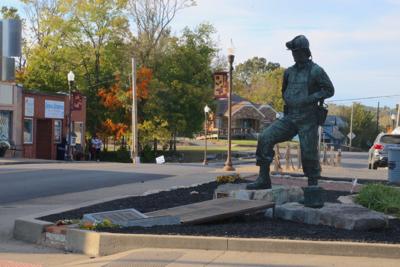PROVIDENCE — Walking through a bathhouse at what until a few years ago was Webster County’s last operating coal mine is not just a moment for Tony Felker to revisit memories. It is also a window into a way of life that he recognizes is disappearing.
Felker is quick to rattle through the nearly four decades of knowledge gained working in coal mines, most of that time as an underground mechanic for Webster County’s Dotiki mine. He walks past a counter where he would pick up a “cap light” before going underground. Markings on the lobby floor are from benches where he sat before work that have been removed.
Tony Felker stands in blue jeans and a teal collared shirt.
Tony Felker, an underground mechanic at the the Dotiki mine before retiring, stands by the mine’s idled coal preparation plant. Felker is a member of the Webster County Fiscal Court. (Kentucky Lantern photo by Liam Niemeyer)
“Well, you get out here and you get dressed, and you see everybody —” he said, his voice trailing off as he looked around the bathhouse. “They’ve changed all of this around.”
The Dotiki mine, operated by Alliance Resource Partners, produced about 2.5 million tons of coal in a year and employed roughly 200 people as recently as five years ago. But on a recent October afternoon, all was quiet, except for a few workers welding equipment to be sent elsewhere. Next to the showers was a large electric-powered “roof-bolter,” also used elsewhere in the company, to train miners.
ARP shuttered the Dotiki mine in 2019 because of “weak market conditions” to focus on its “lower-cost” mining operations elsewhere.
Around the time Felker started working at the Dotiki mine in the early 1990s, Webster County employed more than 1,100 workers in coal mining; now there are no more coal miners left in the county, according to state data.
The disappearance of coal mining in Webster County has been repeated across Kentucky as the cost of electricity generated through natural gas and renewable energy has generally outcompeted coal-fired power in the United States in recent years. It doesn’t matter whether the president was Donald Trump or Joe Biden, Democrat or Republican. Felker, who retired from the Dotiki mine in 2014, has seen coal decline through multiple administrations.
“We were promised by a president that coal would be back,” Felker said. “It hasn’t. It’s losing ground in Kentucky. In other places, too.”
But while Felker, an elected county magistrate and Democrat, understands coal is in decline, he doesn’t want to lose the coal mining that remains in the state.
Kentuckians’ desire to keep the coal industry afloat is also reflected in this year’s campaigns for governor, even as environmentalists point to deadly disasters driven by climate change in Kentucky in recent years.
Burning coal is the single largest source of global temperature increase due to emissions of heat-trapping greenhouse gas emissions. Climate change is causing increased flooding, droughts and a loss of biodiversity across the world.
Environmental advocates say climate change has not spared Kentucky, pointing to the Western Kentucky tornado outbreak in 2021 and devastating floods in Eastern Kentucky in 2022 as examples of increasing extreme weather events driven by climate change.
The metal frame still stands at the former Dotiki mine in Webster County.
But on the campaign trail, climate change is rarely mentioned, if at all, by Democratic Gov. Andy Beshear and Republican challenger Attorney General Daniel Cameron.
Environmental advocates see that omission as not only a political calculation for pro-coal votes in a contentious election but also as a missed opportunity to start a conversation on the realities of climate change in a state that still gets more than two-thirds of its electricity by burning coal.
Cameron and Beshear say they’re advocates for a diverse energy mix including fossil fuels, something that Felker also supports. Felker welcomes new solar installations providing up to 400 megawatts of power capacity that are setting up in his county, part of a rapidly changing energy market in Kentucky.
Louisville Gas and Electric and Kentucky Utilities (LG&E and KU) is proposing before the Kentucky Public Service Commission (PSC) to retire some of its coal-fired power in favor of natural gas and some solar. Across the country, utilities are moving away from coal for economic and climate reasons. Felker was one of several local elected officials from Western Kentucky’s coalfield who urged the PSC to reject LG&E and KU’s plan.
Felker questions the science behind climate change, but says he can’t say it’s untrue because it’s not his area of expertise. Regardless of who wins on Nov. 7, he doesn’t think a governor will be able to stop the decline of coal mining.
“Being in politics, you can’t make a whole lot of promises,” Felker said. “All you’re going to do is tell people what they want to hear.”
A changing climate — and energy market
On the other end of the state, standing at a podium overlooking reclaimed strip mine land along the Perry-Knott county line in Eastern Kentucky, state Energy and Environment Secretary Rebecca Goodman quoted from a study co-authored by a University of Kentucky professor in 1990.
“Those concerned with the future of Appalachia are coming to realize that coal will not drive the economy of the region much beyond the year 2010,” Goodman said. “They also are starting to accept that if the emphasis is to shift away from coal, something will have to be developed to replace its economic impact.”
An 800 megawatt solar installation is planned for the reclaimed Starfire mine site.
The new development Goodman and other state officials were celebrating in July was a planned $1 billion investment by Florida-based solar energy developer BrightNight to build a sprawling solar installation, with a capacity of 800 megawatts on reclaimed mine land.
Kentucky recently ranked last of all states in wind and solar energy generation. But the massive solar investment in Eastern Kentucky serves as just one example of the surge of solar developers moving into the state to establish utility-scale solar installations and sell the power to utilities and companies seeking emissions-free energy sources.
The Kentucky Public Service Commission’s Siting Board, which is in charge of approving new power generation facilities, has seen dozens of requests in the past three years to build new solar farms, compared to past years when the PSC saw no requests to build any new power plants, solar or otherwise. The Tennessee Valley Authority, which provides electricity to parts of Western Kentucky, is planning on retiring its coal-fired power plant fleet by 2035 in favor of primarily natural gas power and some solar power.
Adam Edelen, a Democrat and former Kentucky auditor of public accounts, is a renewable energy developer and played a consulting role in making the BrightNight project happen. He also spearheaded the construction of a solar installation in Martin County, which had a jobs fair last month where former coal miners came interested in the hundreds of construction jobs.
For Edelen, the private sector has moved on to renewable energy regardless of what happens in state government. He said the devastating natural disasters in recent years only highlight the increasing impacts of climate change on the state.
“When I see politicians saying that climate change is a hoax, that the green energy revolution isn’t coming — the fact is both are already here,” Edelen said. “There is no debate. There is no argument. This is settled. And we are either going to adopt the opportunities of the green energy economy, or you get run over by it. That really is the policy decision.”
Citing research from climate scientists around the world including from NASA, the secretary-general of the United Nations has called on rich countries like the U.S. to end use of coal by 2030 and have carbon-free electricity generation by 2035, which means no new natural gas plants either, to prevent the worst effects of increasing climate change. A new study has found the world will likely break the internationally agreed upon threshold for global warming by early 2029 if the current rate of fossil fuel use is sustained.
Yet climate change, in large part, has gone unmentioned by the candidates for governor this year.
What the candidates say — and don’t say
In an August speech to executives and employees of local electricity distribution cooperatives gathered in Louisville, Cameron framed energy questions as part of the “culture wars” debate.
“Let me be clear. Radical climate activism is an assault on more than just our businesses and our energy bills. It happens to be a fundamental threat to our way of life,” Cameron said. “Even if they close every coal plant, put every miner out of work, ban every combustion engine — that’s not their goal. They will not stop. They’ll keep inserting radical gender ideologies into our kids’ classrooms. They’ll keep trying to let boys play girls’ sports.”
But when asked twice by the Lantern after the speech if he believed in the science behind climate change, Cameron didn’t directly answer and instead pointed to the fact that China emits more greenhouse gasses annually than the United States. Because of the United States’ earlier industrialization, the U.S. has contributed more emissions overall since the 1800s.
“I think that we have a responsibility here in Kentucky and across our country to make sure that we have an across the board energy strategy,” Cameron said. “I’m not going to sacrifice coal and natural gas at the altar of the Democratic Party, or Joe Biden or Andy Beshear.”
On the other hand, Beshear has acknowledged the existence of climate change — though infrequently — during his campaign and his time in office. He specifically mentioned the issue during an April press conference announcing federal funding to rebuild housing after the 2021 tornado outbreak in Western Kentucky.
“I believe in climate change. It’s out there, and it’s real. And what it means is that we need to be better prepared in multiple different areas of our lives in ways that we didn’t have to before,” Beshear said at that time.
He also touts his endorsements in the coal industry including by the United Mine Workers of America, even though Kentucky’s last unionized coal mine closed in 2015.
For Chasity Chappell, an EMS worker who survived the EF-4 tornado that came through her home of Dawson Springs in Dec. 2021, the reasoning behind both of the candidates’ support for coal is simple.
“They need the votes,” said Chappell, who supports retaining coal-fired power and Beshear in his reelection because of his handling of natural disasters including tornadoes.
Chappell believes it’s possible climate change played a role in the devastating tornado that came through her small Hopkins County community in the Western Kentucky coalfield, but she isn’t convinced that greenhouse gas emissions are entirely causing it. “You can’t control where a tornado is going to go,” Chappell said. “You can’t control what Mother Nature is going to do.”
Edelen, the former statewide Democratic official and renewable energy developer, applauds how Beshear has handled the “climate emergencies” that have impacted the state in recent years. But he considers Beshear’s decision to largely not mention climate change during his first term in office as missing “a historic opportunity to begin the conversation about climate change.”
“We’re going to see more flooding, we’re going to see rougher weather, we’re going to be dealing with the impacts of a changing climate. And to not ready the public, to not ready our communities, I think, is something that could be judged harshly by history,” Edelen said.
Tom Morris, the political committee chair of the environmental advocacy group Sierra Club’s Kentucky Chapter, said he was “mystified” when the Kentucky Energy and Environment Cabinet earlier this year didn’t apply for federal funds to create a plan to mitigate greenhouse gas emissions.
Such funds would have opened up potentially billions of dollars worth of funding to combat climate change, which coal-reliant states such as Wyoming and West Virginia are taking advantage of. Beshear at the time said such planning was better left to Kentucky’s largest cities.
Morris speculates that Beshear understands the issue of climate change but that either Beshear or his advisors believe the issue to be too “politically risky” to bring up. The environmental advocacy group decided to oppose Cameron’s candidacy instead of endorsing Beshear.
“I just feel like that you don’t always get the candidates you want,” Morris said.
State Sen. Whitney Westerfield, R-Fruit Hill, supports Cameron and believes he and his running mate state Sen. Robby Mills will do the best job of looking out for coalfield communities. Mills, R-Henderson, was the primary sponsor of legislation passed this year that makes it harder for utilities to retire fossil-fuel fired power plants.
“I feel confident that if other market forces at the national or international level forced our hand that I think Robby would best look out for the interests of coal communities to make sure they were impacted adversely as little as possible,” Westerfield said.
The Biden administration is moving forward with proposed regulations seeking to combat greenhouse gas emissions, including a proposed rule from the U.S. Environmental Protection Agency that would require fossil-fuel fired power plants to capture or cut nearly all carbon dioxide emissions by 2028 or be forced to retire.
When asked about calls from the United Nations to rapidly cut greenhouse gas emissions, Westerfield said “Kentucky needs to look out for Kentucky first.”
“I’m not paying attention to what the United Nations has said we ought to do environmentally. I’m just thinking about my own goals. I think it would be nice if one day, maybe in my lifetime, hopefully in my children’s lifetime — we can be energy independent, and we can exist on renewable energy, from whatever source,” he said.
“You can’t just turn the ship around on a dime,” Westerfield said, speaking to his concern about a transitioning energy economy. “How do you get from here to there without just flipping the switch? How do the people who are mining coal today — how can we guarantee that they’re going to have an opportunity for a job tomorrow?”
Not living in the past
Constant on the mind of Felker, the Webster County magistrate and former coal miner, is how to help his community make it to a future beyond reliance on coal.
A close-up of the coal miner statue that overlooks the center of Providence. (Kentucky Lantern photo by Liam Niemeyer).
Sitting in his living room in Providence next to a picture of his two grandchildren, he picks up an issue of the Sebree Banner and points out an article: Webster County had received about $326,000 in federal funding for workforce training.
Felker is more than willing to go after the massive federal funding now available to help coalfield communities make an economic transition. The money comes through bills pushed by the Biden administration, such as the Bipartisan Infrastructure Law, which is providing the money for the local workforce training.
“If we don’t get it, somebody else is,” he said. “We don’t always want to have our hand out. We want to be able to fund ourselves a lot, and I agree with that philosophy. But there’s sometimes where we’re going to have to.”
Felker welcomes solar power into his county but worries the job creation from it will be just a temporary boost during construction. Renewable energy advocates, including Edelen, acknowledge the long-term job creation of renewable energy won’t completely replace the jobs created by coal in the 20th century, though they argue it can play a role in diversifying the state’s future economy.
With the loss of coal production in Webster County, Felker and other officials had to make adjustments to pay for government services formerly funded by coal severance taxes from the state. He also welcomed efforts to reuse old coal mining assets, turning another former Dotiki mine bathhouse into a training center for various trades.
He gets up from his recliner to find the brass replica of a safety lamp that his coal company gave him when he retired. Back in the day when coal miners went underground, they would pack a safety lamp as a way to measure oxygen levels. When the flame light went out, that meant the oxygen levels were low and a miner had to get to safety.
But he doesn’t tinker much with the replica, representing decades of work in coal mines, since he retired.
“It’s not something you pick up and pedal with it everyday. One reason: you don’t need to live in the past. You need to go for the future, and who knows what the future is?” Felker said. “I may not find that out in my lifetime, but I know what I did. And I know what’s working right now. And that’s all I got to go on.”



















Commented
Sorry, there are no recent results for popular commented articles.